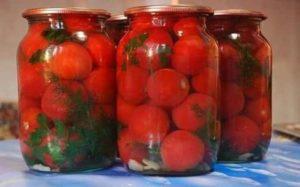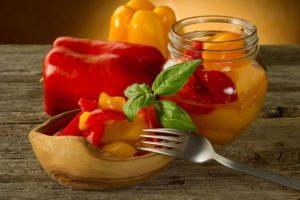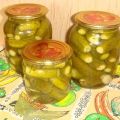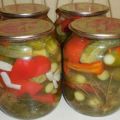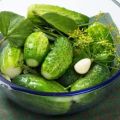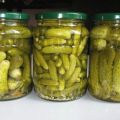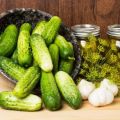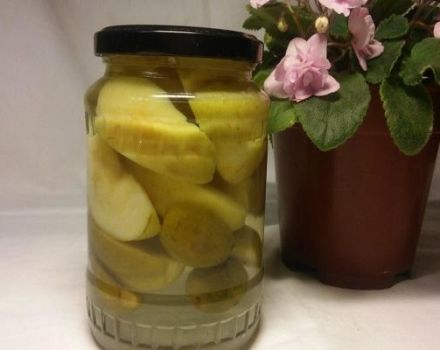TOP 3 recipes for pickled cucumbers in spring water for the winter
Cucumbers for the winter can be salted in clean spring water in a cold and hot way. The area around the spring must be kept clean, the approach is equipped with walkways. This is the key to the compliance of spring water with the standards for the quality of drinking water in terms of microbiological indicators, it can be consumed without boiling and used for harvesting without preliminary processing.
Features of the recipe for well water
Well water, like spring water, is groundwater and its composition depends on the layers of occurrence. It is rich in healthy salts, trace elements that enrich the brine, and keep the cucumbers firm and crispy.
Soft water is not suitable for workpieces.
What cucumbers should be chosen for pickling
For pickling, pick cucumbers of special varieties, including gherkins. Pickling varieties and hybrids: Rodnichok, Zozulya, Barrel pickling, Cheerful guys, Parisian gherkin.
In stores for pickling, young cucumbers with thin skin, pimpled with black or white thorns are chosen.
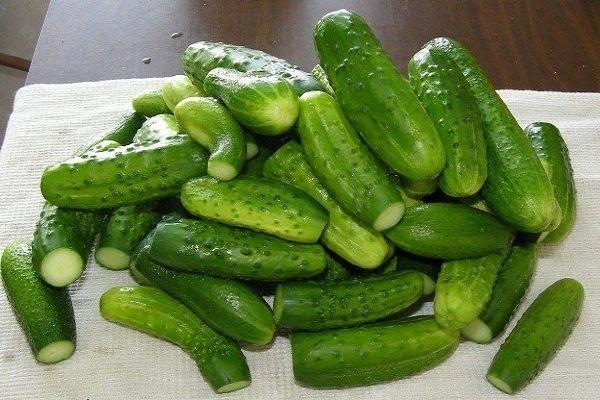
Preparation of all ingredients
Cucumbers are pre-prepared before salting:
- sorted by size;
- wash from dirt with a brush;
- fill with water for 5 hours;
- cut off the ends and pierce with a fork in several places.
Leaves and greens are washed and dried. The garlic cloves and horseradish roots are peeled, the horseradish is cut into circles.
Banks, lids are washed, sterilized by steam or dry-air method.
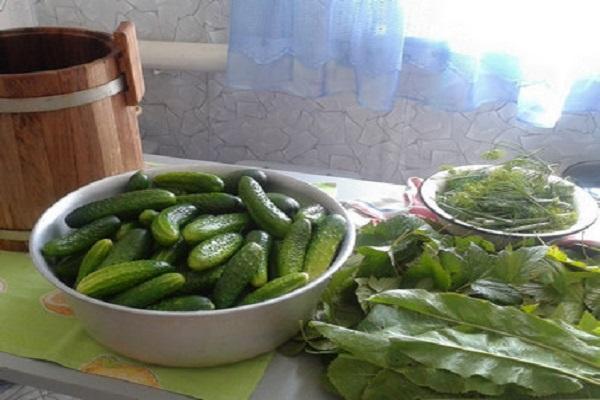
Recipes and cooking rules
To make the cucumbers crispy and tasty, you must follow the rules of preparation, the composition of the recipe, the quality of the products.
Iodized salt will bombard the cans. Iodine evaporates when the salt is ignited in a pan.
With horseradish and dill
Cucumbers can be salted with horseradish and dill, wait until fermentation ends and close the jars hermetically. Blanks are stored for a long time at home.
Horseradish leaves, an umbrella of dill, cloves of garlic, chopped horseradish root, gherkins, horseradish leaves are placed in jars. The contents of the jars are poured with hot brine, left for 10 days for fermentation, then filled with fresh cold brine and closed with metal lids.
For brine:
- water - 1 l;
- salt - 50 g.
For 1 kg of cucumbers:
- horseradish root - 5 g;
- fresh dill - 30 g;
- horseradish leaves - 2 leaves;
- garlic - 3 g.
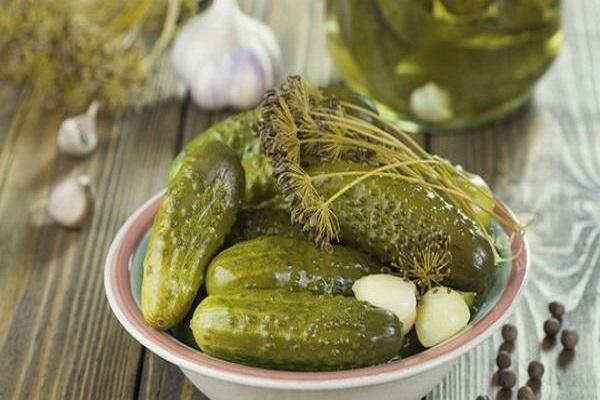
With currant and cherry leaves
Currant and cherry leaves give the pickles a high aroma and taste.
Gherkins are placed in liter jars, shifting with currant leaves, cherries and crushed garlic, chopped horseradish is laid out on top.
Banks are placed in a saucepan with warm water and poured with boiling brine, covered with lids, and left for a day. The brine is drained, boiled, cucumbers are poured twice with an interval of 5 minutes.
At the end, add citric acid or vinegar, seal hermetically.
Ingredients:
- water - 1 l;
- salt - 60 g;
- gherkins - 0.7 kg;
- currant and cherry leaves - 10-15 pcs.;
- horseradish root - 10 g;
- garlic - 3 cloves;
- citric acid - 1 g or
- table vinegar 9% - 5 g.
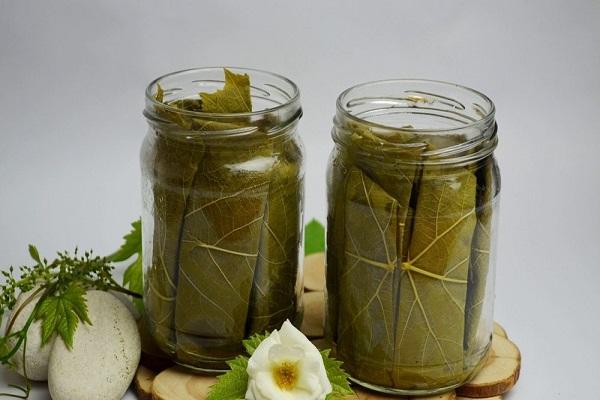
Cold way
Pickled cucumbers with the addition of hot pepper and mustard retain their taste, their green color, have a pleasant mustard aroma and pungent taste.
A 3-liter jar is filled with gherkins, a pod of hot pepper, cloves of garlic, horseradish, dry mustard are placed in the middle, poured with brine, a horseradish leaf is placed on top, covered with plastic lids, stored in a cellar. The fermentation process begins in 2-3 weeks, when part of the brine flows out, it is topped up.
For 1 kg of gherkins:
- salt - 70 g;
- bitter pepper - 4 g;
- garlic - 3 g;
- horseradish root - 5 g;
- dry mustard - 2 g.
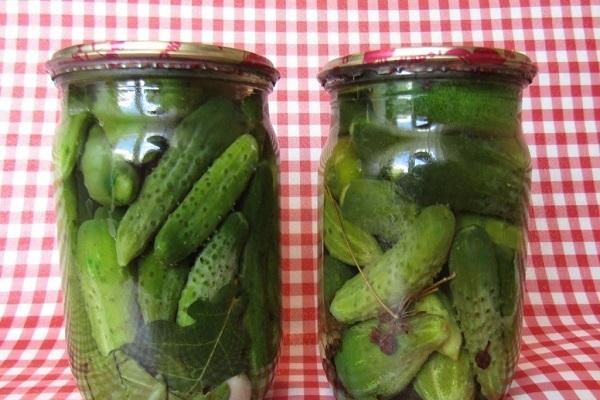
How and with what to serve
Pickled cucumbers are a delicious snack. They are served with aperitifs, main courses, used to prepare:
- salads, vinaigrette;
- pickle, hodgepodge;
- Azu in Tatar;
- toppings for pies.
Crispy pickles before meals will give pleasure, add appetite, facilitate the digestion of fatty foods.
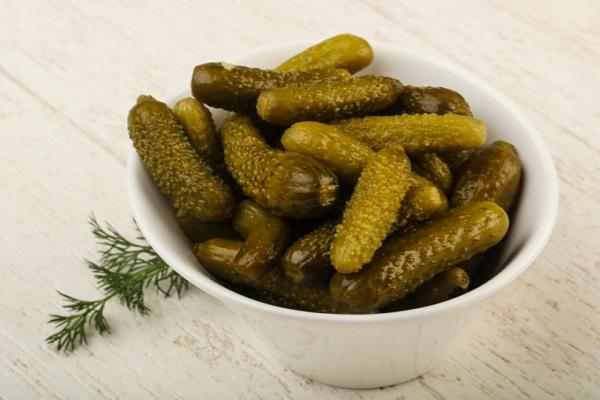
Duration and storage conditions
Cold-cooked cucumbers without heat treatment are stored in a cellar or refrigerator. They retain their taste until the next harvest.
Hermetically sealed cans are kept at home away from heating devices and heating systems for up to 2 years.
